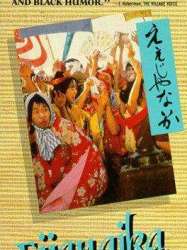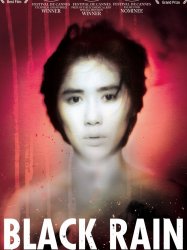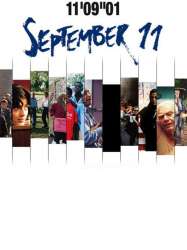Profound Desires of the Gods is a japonais film of genre Drama directed by Shōhei Imamura with Yoshi Katō
Profound Desires of the Gods (1968)
Kamigami no Fukaki Yokubo

If you like this film, let us know!
The Profound Desires of the Gods or Deep Desires of Gods or Kuragejima – Legends from a Southern Island (神々の深き欲望, Kamigami no Fukaki Yokubō) is a 1968 Japanese film by director Shohei Imamura. The culmination of the director's examinations of the fringes of Japanese society throughout the 1960s, the film was an 18-month super-production which failed to make an impression at the time of its release, but has since risen in stature.
Synopsis
Presenting a vast chronicle of life on the remote Kurage Island, the film centres on the disgraced, superstitious, interbred Futori family and the Tokyo engineer sent to supervise the creation of a new well for the Sugar Mill – an encounter which leads to both conflict and complicity in strange and powerful ways.Actors

Yoshi Katō
(Ritsugen Ryu)

Rentarō Mikuni
(Nekichi Futori)

Kanjūrō Arashi
(Yamamori Futori)

Jun Hamamura
(Satokuri)

Chikako Hosokawa
(Mrs. Azuma)

Kazuhiko Hasegawa
(Young Man)
Comments
Leave comment :
Suggestions of similar film to Profound Desires of the Gods
There are 95 films with the same actors, 21 films with the same director, 61805 with the same cinematographic genres, to have finally 70 suggestions of similar films.If you liked Profound Desires of the Gods, you will probably like those similar films :

Vengeance Is Mine (1979)
, 2h20Directed by Shōhei Imamura, Taku Shinjō
Origin Japon
Genres Drama, Crime
Themes Serial killer films
Actors Ken Ogata, Mayumi Ogawa, Rentarō Mikuni, Mitsuko Baishō, Taiji Tonoyama, Kazuko Shirakawa
Rating76%





The film's story is told in a series of flashbacks. In the opening scenes, Iwao Enokizu (Ken Ogata), is a prisoner of the police. A huge crowd of journalists and an angry mob greets him as he enters a cell. The police quiz him but he refuses to answer. The story goes back to the initial murders. Enokizu tricks and then kills two men and steals a large sum of money. He puts on a suit and disappears. Enokizu travels to another city. At the train station, he asks a taxi driver to take him to an inn where he can get a prostitute. Enokizu is sexually insatiable. He tells the innkeeper, a woman called Haru (Mayumi Ogawa), that he is a professor at Kyoto University. The police, searching for Enokizu, put out bulletins with his face on television. The prostitute thinks the professor is Enokizu, but she is told not to go to the police because of her job.

Intentions of Murder (1964)
, 2h30Directed by Shōhei Imamura
Origin Japon
Genres Drama
Actors Masumi Harukawa, Kō Nishimura, Shigeru Tsuyuguchi, Yoshi Katō, Yūko Kusunoki, Tomio Aoki
Rating75%





The film tells the story of a dull, plump housewife living in poverty with a common-law husband. After being raped by a thief, she is repeatedly accosted by him as he falls madly in love with her. Stuck between her adulterous, unloving husband and the rapist she struggles to find happiness.

The Insect Woman (1963)
, 2h3Directed by Shōhei Imamura
Origin Japon
Genres Drama, Documentary
Actors Masumi Harukawa, Sachiko Hidari, Teruko Kishi, Tanie Kitabayashi, Hiroyuki Nagato, Asao Koike
Rating73%





A woman, Tome, (Sachiko Hidari) is born to a lower-class family in Japan in 1918. The film is a metaphor for life in Japan through the middle twentieth century, including World War II. The title refers to an insect, repeating its mistakes, as in an infinite circle. Imamura, with this metaphor, introduces the life of Tome, who keeps trying to change her poor life.

Why Not? (1981)
, 2h31Directed by Shōhei Imamura
Origin Japon
Genres Drama
Themes Seafaring films, Sports films, Transport films, Martial arts films
Actors Kaori Momoi, Ken Ogata, Shigeru Izumiya, Yūko Tanaka, Mitsuko Baishō, Shigeru Tsuyuguchi
Rating67%





The film depicts carnivalesque atmosphere summed up by the cry "Ee ja nai ka" ("Why not?") in Japan in 1867 and 1868 in the days leading to the Meiji Restoration. It examines the effects of the political and social upheaval of the time, and culminates in a revelrous march on the Tokyo Imperial Palace, which turns into a massacre. Characteristically, Imamura focuses not on the leaders of the country, but on characters in the lower classes and on the fringes of society.

The Ballad of Narayama (1983)
, 2h10Directed by Shōhei Imamura
Origin Japon
Genres Drama
Themes Films about families, Seafaring films, Transport films, Vieillesse
Actors Ken Ogata, Mitsuko Baishō, Taiji Tonoyama, Nenji Kobayashi
Rating77%





The film is set in a small rural village in Japan in the 19th century. According to tradition, once a person reaches the age of 70 he or she must travel to a remote mountain to die of starvation, a practice known as ubasute. The story concerns Orin, who is 69 and of sound health, but notes that a neighbor had to drag his father to the mountain, so she resolves to avoid clinging to life beyond her term. She spends a year arranging all the affairs of her family and village: she severely punishes a family who are hoarding food, and helps her younger son lose his virginity.

Black Rain (1989)
, 2h3Directed by Shōhei Imamura
Origin Japon
Genres Drama, War, Historical
Themes Seafaring films, Transport films, Aviation films, Political films, Arme nucléaire
Actors Yoshiko Tanaka, Etsuko Ichihara, Keisuke Ishida, Taiji Tonoyama, Akiji Kobayashi, Kenjirō Ishimaru
Rating77%





The film moves between Shizuma Shigematsu's journal entries about Hiroshima in 1945, following the dropping of the atomic bomb, and the present, 1950, when Shigematsu and his wife Shigeko are the guardians for their niece Yasuko and charged with finding her a husband (she has been declined three times due to concerns over her having been in the "black rain" fallout). As the story progresses, Shigematsu sees more and more fellow hibakusha, his friends and family, succumbing to radiation sickness and Yasuko's prospects for marriage become more and more unlikely, as she forms a bond with a poor man named Yuichi, who carves jizo and suffers a form of post-traumatic stress disorder where he attacks passing motor vehicles as "tanks."

The Eel (1997)
, 1h57Directed by Shōhei Imamura
Origin Japon
Genres Drama, Crime
Themes Films about domestic violence
Actors Kōji Yakusho, Misa Shimizu, Mitsuko Baishō, Akira Emoto, Shō Aikawa, Etsuko Ichihara
Rating72%





Acting on the advice of an anonymous note, Takuro Yamashita (Kōji Yakusho) returns home early one night to find his wife in bed with another man. He kills her and then turns himself in to the police. After being released from prison, he opens a barber shop and brings along a pet eel which he talks to while mostly ignoring conversation with others. He helps save Keiko Hattori (Misa Shimizu) from a suicide attempt, resulting in her working at the shop. She starts developing romantic feelings for him, but he acts nonchalant and refuses the boxed lunches she prepares for him when he goes eel-hunting with the fisherman Jukichi Takada. Takuro recognizes the local garbageman from prison and the garbageman starts to stalk Takuro and Keiko, believing that Takuro isn't repentant enough for his crimes. He attempts to rape Keiko and leaves a letter revealing Takuro's past on the door of his barber shop, but it is removed by Takada. Keiko finds out that she is pregnant with the baby of Eiji Dojima (Tomorowo Taguchi), a loan shark, and that it is too late for an abortion. One night the garbageman goes to Takuro's shop and lectures him, accusing him of killing his wife out of jealousy. The two get into an altercation and Takuro fends him off. Keiko goes back to her old company, where she is the vice-president, and retrieves her mother's bankbook. This results in Dojima angrily going to the barber shop, along with henchman, and accusing her of theft since he was planning to reinvest the funds into his business. Dojima's group and Keiko's fight, with the false revelation that Keiko is pregnant with Takuro's child. The police find that Keiko's mother never signed power of attorney papers for Dojima, but a parole violation meeting for Takuro causes him to be sent back to prison for a year. Takuro lets his eel go and accepts a boxed lunch from Keiko, who promises to wait for him with her baby.

Dr. Akagi (1998)
, 2h9Directed by Shōhei Imamura
Origin Japon
Genres Drama, War, Comedy, Comedy-drama, Historical
Actors Akira Emoto, Kumiko Asō, Jacques Gamblin, Jūrō Kara, Keiko Matsuzaka, Misa Shimizu
Rating71%





The film concerns Dr. Akagi, a doctor on an island in the Seto Inland Sea area during World War II. He runs into conflict with the military while trying to combat a hepatitis epidemic. Akagi earns the nickname "Dr. Liver" (カンゾー先生 Kanzō-sensei) because of his work.
 , 1h59
, 1h59Directed by Shōhei Imamura
Origin Japon
Genres Drama, Science fiction, Comedy, Comedy-drama, Romantic comedy, Fantasy, Romance
Themes Films about sexuality, Erotic films
Actors Kōji Yakusho, Misa Shimizu, Mitsuko Baishō, Toshie Negishi, Isao Natsuyagi, Takahito Iguchi
Rating66%





Warm Water Under A Red Bridge focuses on the troubles of a Japanese "everyman" who finds a new life with an unusual woman in a small fishing village. Imamura's last film contains considerable commentary on the search for happiness.

11’09”01—September 11 (2002)
, 2h15Directed by Sean Penn, Claude Lelouch, Amos Gitaï, Youssef Chahine, Alejandro González Iñárritu, Danis Tanović, Ken Loach, Idrissa Ouédraogo, Shōhei Imamura, Mira Nair, Samira Makhmalbaf
Origin Iran
Genres Drama
Themes Films based on the September 11 attacks, Medical-themed films, Films about terrorism, Transport films, Aviation films, Films about disabilities, Dans un avion, Disaster films, Sign-language films, French Sign Language films, Films about language and translation, Films about hijackings
Actors Ernest Borgnine, Emmanuelle Laborit, Akira Emoto, Mitsuko Baishō, Ken Ogata, Keren Mor
Rating67%





Dans un village au Moyen-Orient, la population se prépare à des représailles américaines en préparant des abris de terre cuite. Personne n'appréhende vraiment ce qui s'est passé à New York, mais ils savent que, même s'ils n'ont rien à voir avec cela, ils vont en subir les conséquences. Le film dénonce la manière dont des villages innocents dont la réalité n'a rien à voir avec les attentats du 11 septembre subissent finalement le même sort que les tours, sans vraiment comprendre.
 Connection
Connection